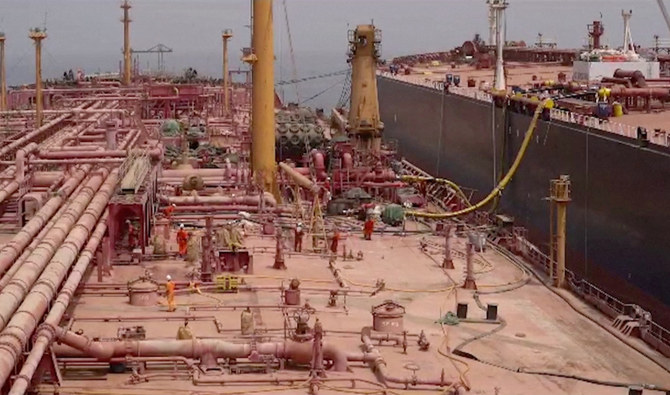AL-MUKALLA, Yemen: The UN has said that nearly one third of the oil on Yemen’s deteriorating Safer tanker has been transferred to a new tanker, as Yemenis expressed optimism about the operation to salvage the vessel.
The UNDP administrator, Achim Steiner, said on Sunday that 360.000 barrels of oil were pumped from the aging tanker to the replacement tanker.
“The #FSOSafer carried 1.15 m barrels of oil. To date 360,000 barrels or 1/3 have been transferred to the replacement tanker, the Yemen. Unwavering determination and great work by our teams continue to drive the #StopRedSeaSpill operation,” Steiner said on X.
Last week, the UN announced the start of the long-awaited process of transferring more than 1 million barrels of oil from the FSO Safer tanker to a new tanker.
Moored off the coast of Yemen’s western city of Hodeidah, the 47-year-old tanker has been in danger of collapsing or exploding since rust began eating away at the tanker’s wall, allowing water to enter.
Experts have long warned of a massive environmental disaster if the tanker’s oil poured into the water, threatening the natural ecosystem and the livelihoods of thousands of Yemenis.
People in Yemen have expressed hope that the actions will end the threat posed by the Safer tanker.
Nabil bin Aifan, maritime safety researcher from Yemen’s Mukalla and a Ph.D. candidate at the Arab Academy for Science Technology and Maritime Transport in Egypt, told Arab News that the operation would benefit Yemen by removing the threat posed by the Safer tanker and providing the country with a new tanker to store oil for the future once the war ends.
“This is fantastic news that oil transfer from one tanker to another has begun,” the researcher said.
“Despite its late arrival, this phase is critical. The delay is being blamed on the Houthis and United Nations organizations due to their lack of effective pressure on the Houthis,” he said.
Basem Al-Ruzaigi, director of the government-controlled Mocha on the Red Sea, told Arab News that warnings about the tanker exploding or sinking had caused great concern among the Yemeni people, particularly those living along the country’s Red Sea coastline, and the UN should take care of the replacement tanker.
“The (new) ship must be routinely maintained so that the tragedy and problem do not reoccur.”
Other Yemenis, including the director of the port of Mocha, Abdul Malik Al-Shaibani, have said that the UN was defusing a time bomb, but that if oil was stored in the new tanker and not maintained permanently, it would generate a second time bomb.
“Safer is a ticking time bomb, and the alternative is likewise a ticking time bomb,“ Al-Shaibani told Arab News.
“The oil must be sold, and the new tanker must undergo thorough and continual maintenance, not just for six months, as the United Nations says,” he said.




















